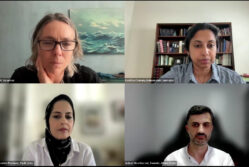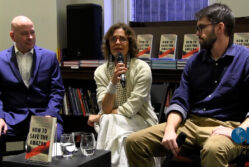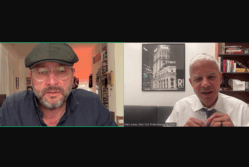Event Coverage Highlight

Cornelius Ryan Award Winner Calls Lack of Vaccine Transparency ‘Bad News’
by Chad Bouchard
For about a decade, journalist and author Katherine Eban reported on lapses in the production of generic drugs for the U.S. market, ultimately piecing together a picture of massive fraud and scant oversight for a system that provides the majority of generic drugs sold in the U.S.
Her decade of investigative work is distilled in her book, Bottle of Lies: The Inside Story of the Generic Drug Boom, which won this year’s Cornelius Ryan Award for best non-fiction book on international affairs.
There had been small efforts to reform the system after Eban’s book came out in May 2019, including congressional hearings looking into U.S. Food and Drug Administration oversight of foreign drug plants, “but then COVID hit,” she said, and progress quickly evaporated.
On Nov. 10, 2020, the OPC hosted an online program with Eban, whose grim look at the pharmaceutical industry has taken on new and chilling relevance as the world races to find treatments and vaccines to curb the coronavirus pandemic, amid easily gamed FDA inspection systems, lack of transparency in pharmaceutical companies and regulators, rampant data fraud and even less oversight than when the book was published.
“We have FDA inspectors who can’t go into plants overseas [due to COVID-19 restrictions], we’ve got countries that have threatened to cut off exports to our country, we have a huge struggle to get everything from starting chemicals to glass vials,” she said. “The whole question of our global drug supply has proved to be really dangerous and inadequate in an age of COVID.”
Moderating the panel was Dan Hertzberg, freelance journalist and former senior deputy managing editor and later deputy managing editor for international news at The Wall Street Journal, who served as head judge for the Cornelius Ryan Award jury.
He asked Eban, who has continued to report on the pharmaceutical industry for Vanity Fair, to outline the current state of FDA oversight, with overseas inspections suspended, and the agency possibly sidestepping its own inspections for vaccine development.
“If firms get emergency approval, they are not required by regulation to do a full inspection. That is really bad news,” she said. “I spent ten years in Bottle of Lies reporting on everything that goes wrong in these manufacturing plants, and I emerged from that reporting experience very sure I never wanted to take any kind of medication from a facility that had not been inspected by the FDA.”
Eban said the pandemic shined “a massive flashing red light” on vulnerabilities in the global drug supply, which she added were well known as a national security risk among many observers even before the challenges of 2020.
Eban’s book in part follows the story of Dinesh Thakur, an Indian executive at the generic drug maker Ranbaxy Laboratories, who blew the whistle to the FDA on a massive effort within the company to falsify data on quality and safety testing.
The company conducted an investigation and sent a report in the form of a PowerPoint presentation to the board, but board members buried the report, “and opted to destroy the computer on which the PowerPoint was created,” Eban said. “They took apart the computer piece by piece.”
Plants in India make more than 40 percent of finished generic drugs sold in the U.S., and at least 80 percent of the active ingredients in all drugs for the U.S. market are from overseas.
She added that the book follows several other characters, revealing a picture of how the kind of fraud seen at Ranbaxy is common business within the overseas generic drug industry.
A lack of adequate staffing or inspection from the FDA enables the rampant system of fraud, Eban argued, worsened by practices such as pre-warning facilities two months in advance when inspectors are on their way. FDA inspectors do not announce site visits in the U.S.
She said the overseas plants employ “data fabrication teams” to prepare for inspectors’ arrival, and pay for what one of her sources called “regulatory tourism,” in which plants treat inspectors to top accommodations and arrange sightseeing tours and spa visits.
Eban foresees big conflicts coming in the near future over how vaccines will be distributed, as well as questions about quality and safety in the way they are manufactured and inspected.
“The question of a COVID vaccine will turn into one of the biggest pharma stories in history.”
She said many journalists and watchers have been focused on the possibility of political intervention in the vaccine approval process, in an expedited schedule for the White House handling of its vaccination program, Operation Warp Speed, ahead of the election, which did not come to pass.
“The two things you never want to mix are politics and vaccines,” Eban said.
Bottle of Lies is available here >>



